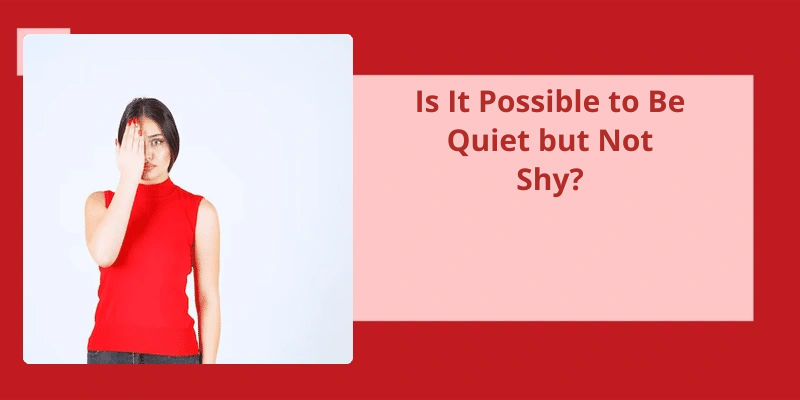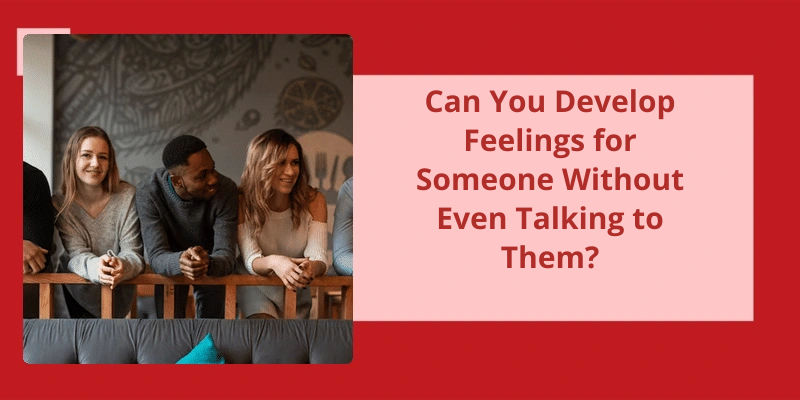In fact, it can be a valuable quality, allowing individuals to better observe and analyze situations before responding. However, the stereotype that quietness equates to social anxiety and a lack of confidence can lead to misinterpretation and exclusion in social situations. It’s possible for someone to be naturally introverted or simply prefer to listen more than speak without feeling uncomfortable or nervous. It’s important to recognize and respect different communication styles, rather than expecting everyone to fit into the same extroverted mold. Quiet individuals can bring unique strengths and perspectives to the table, and shouldn’t be dismissed or underestimated due to antiquated societal expectations.
Are Silent People Shy?
Introversion is a personality trait that’s often misunderstood. Many people believe that shy individuals are the same as introverts when in reality, they’re not. They may stay silent because they’re taking everything in and processing it before expressing their thoughts.
It’s important to note that introverts aren’t anti-social or unhappy individuals. They simply prefer to have alone time to recharge and process their thoughts. This can be misunderstood by those who’re more extroverted and feed off of social interactions.
Research has shown that quiet individuals tend to be more creative and sensitive than those who’re more vocal. This may be because they’ve more time to reflect and process their thoughts before expressing them. They may also be more observant of their surroundings, allowing them to pick up on details that others may overlook.
It’s important to not make assumptions about individuals based on their level of vocalization. Just because someone is quiet doesn’t mean they’re shy or unhappy. They may simply prefer to listen and observe rather than speak. It’s important to respect everyones unique personality traits and strengths.
Quiet individuals are often misunderstood and labelled as shy or anti-social. However, this isn’t always the case. Next time you encounter a quiet individual, take the time to get to know them and appreciate their perspective.
A quiet personality can often be misunderstood as shyness or social awkwardness, but it’s important to note that this isn’t always the case. In fact, quiet people can be just as sociable and outgoing as their more talkative counterparts. So, what does it mean to have a quiet personality? Let’s explore further.
What Does a Quiet Personality Mean?
They’re just not loud and boisterous like some individuals. Quiet People tend to be good listeners and observe more than they speak. They think before they speak and often choose their words carefully. They’ve a preference for inner reflection and introspection rather than constant interaction with others. Quietness can also make someone seem distant or detached, even though they may simply prefer to observe silently rather than engaging in conversations or activities.
Quietness can also be a sign of inner strength. These individuals are often comfortable with who they’re and don’t feel the need to constantly prove themselves to others. They’re content to just be themselves and let their actions speak for themselves. They also tend to be very self-aware and are able to recognize their own limitations and boundaries.
One of the benefits of being a quiet person is that they tend to have a calming presence. They aren’t combative or confrontational, and they don’t seek attention or drama. They’re often able to diffuse tense situations with their calm and approachable demeanor. They also tend to be very empathetic and are able to connect with others on a deep level.
They aren’t easily distracted and are able to tune out extraneous noise and stimuli in order to complete tasks or projects. They’re also often good problem solvers and are able to approach problems from a different perspective than others.
The Benefits of Being a Quiet Leader in the Workplace
Being a quiet leader in the workplace has it’s advantages. Quiet leaders listen more than they speak, which allows them to understand their team’s needs and concerns better. They also build trust and establish better relationships with team members who feel heard and valued. Furthermore, quiet leaders can communicate effectively by providing concise and thoughtful responses that help them get their message across effectively. Overall, being a quiet leader can lead to improved team performance, increased productivity, and better employee engagement.
Introverted individuals are often perceived as quiet and reserved, sometimes leading others to question what causes someone to have a more subdued personality. While there may be many factors that contribute to a person’s quiet tendencies, it’s important to remember that introversion isn’t a flaw to be fixed. In fact, embracing and understanding introversion can lead to a more fulfilling and satisfying life. So, let’s explore some of the reasons why someone may be a quiet person.
What Causes Someone to Be a Quiet Person?
The reasons behind someones quiet demeanor can vary greatly. Some individuals may simply be introverted or shy, preferring to keep to themselves and avoid social interactions. Others may have experienced trauma or difficult life experiences that have led them to retreat within themselves and avoid social situations. Additionally, cultural or familial influences may play a role in shaping an individuals behavior and personality traits.
For example, a noisy or chaotic environment may be overwhelming for some individuals, leading them to withdraw and become more reserved. Similarly, a lack of social support or positive relationships can cause someone to isolate themselves and avoid social interactions.
Biological factors may also influence someones tendency to be quiet or introverted. Some studies suggest that introverted individuals may have a more reactive amygdala, the part of the brain responsible for processing emotions. This heightened sensitivity to emotional stimuli may make social interactions more overwhelming for some individuals, leading them to avoid them whenever possible.
While some factors may be more influential than others, it’s important to recognize that everyone is unique and has their own experiences and reasons for behaving the way they do. Rather than making assumptions or judgments about someones behavior, it’s important to approach each individual with empathy, understanding, and kindness.
It’s natural to experience occasional shyness in social situations. However, for some individuals, shyness can become an overwhelming obstacle that affects their daily life. Shyness can manifest in various ways, from physical symptoms to negative self-perception. In this article, we will explore the signs of a shy person and offer some practical tips to help overcome shyness.
What Are the Signs of a Shy Person?
This is understandable and perfectly normal. After all, social interaction can be intimidating and stressful, especially when one feels insecure or self-conscious. However, when shyness becomes so severe that it impairs everyday functioning or causes significant distress, it may indicate a more serious condition, such as social anxiety disorder.
Social anxiety disorder is a common mental health condition characterized by an intense fear of social situations and performance scrutiny. Individuals with social anxiety disorder often experience debilitating or overwhelming feelings of anxiety, embarrassment, and self-consciousness, which can significantly impede their ability to communicate with others or form meaningful relationships. They may avoid all social situations or only attend them with great reluctance and anxiety.
However, while introverts prefer solitude or quiet company, they don’t necessarily feel anxious or uncomfortable in social situations. They can be sociable and outgoing when the occasion calls for it or when they’re comfortable with the people around them. Furthermore, being shy doesn’t necessarily mean that an individual lacks self-confidence or social skills. Many shy people are perfectly capable of expressing themselves and holding their ground; they just feel more comfortable doing so in familiar or slower-paced environments.
The signs of a shy person aren’t always apparent or straightforward. Some individuals may display physical symptoms, while others may exhibit more subtle behaviors, such as avoiding eye contact, speaking softly, or fidgeting. It is, therefore, important to understand and acknowledge shyness as a fundamental aspect of human nature and to provide individuals with the necessary support and understanding to overcome it.
How to Help a Shy Person Feel More Comfortable in Social Situations.
Here are some tips to help a person who’s shy feel more comfortable in social situations: encourage them to take small steps, such as initiating a conversation or joining a group; be supportive and patient with them; avoid putting pressure on them to socialize if they’re not ready; and offer positive reinforcement for their efforts.
Understanding why silence can evoke feelings of awkwardness is important as it can help us navigate social situations and build stronger connections with others. While some may find silence uncomfortable, it can also bring a sense of comfort and intimacy, particularly when with someone we trust and care for deeply. So, let’s explore the different ways that silence can impact our interactions with others and how we can learn to embrace it in our social lives.
Why Does Silence Make Me Feel Awkward?
However, in social situations with acquaintances or strangers, silence can trigger anxiety. This can be because we may feel like we aren’t interesting enough or we may be afraid of being judged or rejected. The pressure to fill the silence with something interesting, witty or entertaining can be overwhelming, and it can lead to feelings of discomfort and awkwardness.
Moreover, silence can also trigger negative emotions like anger, sadness, or frustration. For example, if you’re in an argument with someone and they suddenly stop talking, the silence can be deafening. You may feel like they’re shutting you out or that they aren’t interested in what you’ve to say.
In addition, lack of communication can also lead to misunderstandings or misinterpretations. In a group setting, if no one is talking, it can be challenging to gauge the mood or the vibes in the room. This can easily lead to miscommunication and misinterpretation of other peoples thoughts and feelings, which can in turn cause misunderstandings.
Lastly, it’s essential to recognize that silence can also be a form of communication. It can be a sign of respect, contemplation, or more importantly, it can be a way to listen. Listening allows us to connect with others on a deeper level, and it allows us to be more present and authentic in our conversations.
Learning to embrace silence and using it to connect with others can help us build stronger relationships and become better communicators.
Conclusion
In fact, it can be a strength, and it's important for us to recognize and value the diverse ways in which people engage with the world around them. Whether someone is naturally introverted, reserved, or simply prefers to observe before speaking, there are many ways to be quiet without being shy or lacking confidence. By celebrating and supporting different approaches to communication, we can create a more inclusive and vibrant society where all voices are heard and respected. So let's embrace the richness of quietness and reject the stereotypes that limit our understanding of one another.






